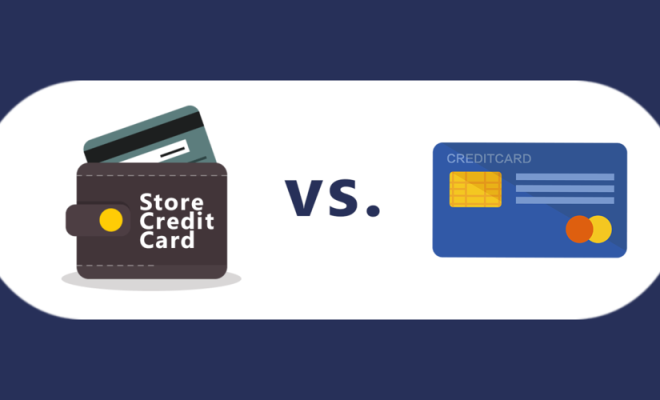Store Cards vs. Traditional Credit Cards: What’s the Difference?

Introduction
Credit cards have become an essential tool in our day-to-day spending habits, making it easier to shop and pay for different products and services. While consumers are usually familiar with traditional credit cards, store cards are another option that may offer unique benefits and rewards. This article will explore the differences between store cards and traditional credit cards, helping you make an informed decision on which card is right for you.
Store Cards: Pros and Cons
1. Pros:
– Store-Specific Rewards: Store cards often come with rewards programs tailored to the specific retailer. These rewards can include discounts, cashback offers, special promotions, or early access to sales events.
– Easier Approval: Store cards generally have less stringent credit requirements than traditional credit cards, making them more accessible for consumers with less-than-stellar credit.
– Establishing Credit: If you have no credit history or a low credit score, getting a store card might be a good way to begin establishing a positive credit profile.
2. Cons:
– Limited Usability: Store cards can often only be used at the specific retailer they’re tied to, which limits their usability compared to traditional credit cards.
– High-Interest Rates: Store cards typically have higher interest rates than traditional credit cards, making them more expensive if you carry a balance month-to-month.
– Potential to Encourage Overspending: Store card rewards tied to specific retailers might tempt you into buying items you don’t necessarily need just to qualify for the incentives.
Traditional Credit Cards: Pros and Cons
1. Pros:
– Widespread Usability: Traditional credit cards can be used anywhere that accepts credit card payments, allowing you greater flexibility in your purchasing habits.
– Lower Interest Rates: Generally, traditional credit cards come with lower interest rates compared to store cards, which can save you money in the long run if you carry a balance.
– Varied Rewards Programs: Many traditional credit cards offer rewards programs that can be tailored to your spending habits, such as points, cashback, or travel rewards. This allows you to earn rewards on a broader range of purchasing categories.
2. Cons:
– Stricter Credit Requirements: Traditional credit cards often have stricter credit score requirements, making them more difficult to obtain for consumers with lower credit scores.
– Annual Fees: While some traditional credit cards come with no annual fees, others might have an annual fee that could offset any rewards earned if you don’t use the card enough.
Conclusion
Store cards and traditional credit cards each come with their unique advantages and disadvantages. Depending on your specific needs, preferences, and financial situation, you may find one type of card to be more suitable than the other. Weighing the benefits and drawbacks will ultimately help you make an informed decision in choosing the best card option to suit your needs.





